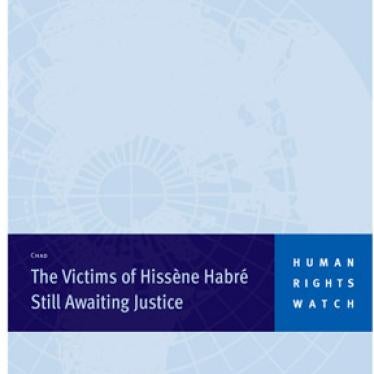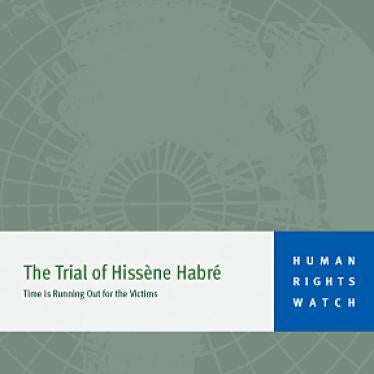(Brussels)- The European Parliament today called on Senegal to bring Hissène Habré to trial or extradite the former dictator of Chad to Belgium, where he is wanted to stand to trial. Habré’s victims and their supporters cheered the European Parliament’s decision.
Habré, who fled to Senegal in 1990 after an eight-year rule marked by widespread atrocities, was first indicted in 2000 in Senegal. After Senegalese courts ruled that he could not be tried there, Habré’s victims pursued justice by turning to Belgium, which after a four-year probe indicted him in September 2005 on charges of crimes against humanity, war crimes and torture.
In November, after a Senegalese court refused to rule on his extradition, the Senegalese government asked the African Union to decide the matter. The African Union in January appointed a committee of jurists to study the case and propose a solution to the forthcoming A.U. summit in July. The European Parliament asked the African Union to “ensure that Senegal respects its international engagements.”
“The international community doesn’t understand why, fifteen years after his atrocities, Hissène Habré has still not been brought to trial,” said Jacqueline Moudeina, president of the Chadian Association for the Promotion and Defense of Human Rights, who is also the lawyer for the victims. “Belgium is ready, willing, and able to provide Habré’s victims with justice, which Senegal has long denied them.”
The European Parliament resolution, which was adopted by a vote of 85 for and one abstention, “calls on Senegal to guarantee a fair trial to Hissène Habré, through his extradition to Belgium if there is not an African alternative, in accordance with the U.N. Convention against Torture and Other Cruel, Inhuman, or Degrading Treatment or Punishment.” Moreover, it “calls on the African Union, within the framework of the case against Hissène Habré, to ensure that Senegal respects its international engagements as a state party to the Convention against Torture.”
“Europe stands fully behind Belgium’s extradition request for Hissène Habré,” said Ana Gomes, a Portuguese member of the European Parliament and sponsor of the resolution. “Habré’s extradition would be milestones in the fight to hold the perpetrators of atrocities accountable for their crimes. They would serve as a warning to other dictators not to engage in crimes against humanity lest they be brought to trial.”
Under the Convention against Torture, Senegal has a legal obligation to prosecute or extradite Hissène Habré. The Belgian government has announced that it will bring Senegal to the International Court of Justice if it fails to meet its legal obligations.
The European Parliament also repeated its call for Nigeria to surrender Charles Taylor, the former president of Liberia, to the Special Court for Sierra Leone. The Parliament previously passed a resolution in February 2005 calling for Taylor’s surrender to the court, which indicted him on seventeen counts of war crimes and crimes against humanity.
To see a copy of the European Parliament resolution, “Impunity in Africa and in particular the case of Hissène Habré,” click here.
Background
Hissène Habré ruled Chad from 1982 until 1990, when he was deposed by current President Idriss Déby and fled to Senegal. His one-party regime was marked by widespread atrocities. Habré periodically targeted various ethnic groups, killing and arresting group members en masse when he believed that their leaders posed a threat to his regime. Files of Habré’s political police, the DDS (Direction de la Documentation et de la Sécurité), discovered by Human Rights Watch in 2001, reveal the names of 1,208 persons who died in detention. A total of 12,321 victims of different abuses were mentioned.
In February 2000, a Senegalese court charged Habré with torture and crimes against humanity and placed him under house arrest. But in March 2001, Senegal’s highest court said that Habré could not stand trial in Senegal for crimes allegedly committed elsewhere. Habré’s victims immediately announced that they would seek Habré’s extradition to Belgium, where twenty-one of Habré’s victims had filed suit. President Abdoulaye Wade of Senegal then stated that he would hold Habré in Senegal and that “if a country capable of organizing a fair trial – there is talk of Belgium – wants him, I do not foresee any obstacle.”
A four-year investigation by a Belgian judge resulted in an international arrest warrant against Habré on September 19, 2005, and his arrest in Senegal on November 15. On November 25, a Senegalese court said that it had no jurisdiction to rule on the extradition request. On November 27, Senegalese Foreign Minister Cheikh Tidiane Gadio said that it was “up to the African Union summit to indicate the jurisdiction which is competent to hear the case.”







